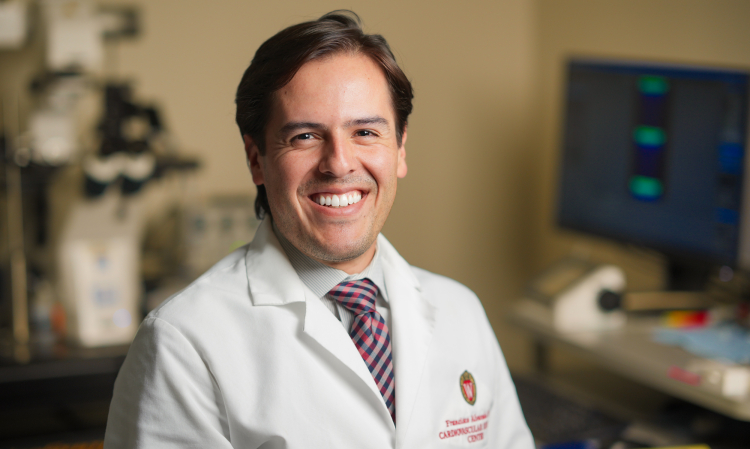Dr. Francisco Alvarado named UW School of Medicine and Public Health Centennial Scholar

Francisco Alvarado, PharmD, PhD, assistant professor, Cardiovascular Medicine, was accepted into the University of Wisconsin School of Medicine and Public Health (SMPH) Centennial Scholars/Centennial Clinicians Program.
Dr. Alvarado’s research aims to better understand the mechanisms of heart disease, especially calcium-dependent arrhythmias and structural cardiomyopathies.
Learn more about him and his work in this Q&A:
What research areas are you passionate about?
I am interested in the regulation of cardiac function in the healthy and diseased heart. When I was in high school, my dad was diagnosed with severe coronary artery disease, and he required multiple stents. This is when I became interested in the heart.
My passion lies on cardiac electrophysiology and excitation-contraction coupling, the processes that choreograph the electrical signals that excite the heart and the machinery that interprets those signals and produce mechanical contraction.
What problem are you trying to solve with your research?
Over the years, increasing evidence supports the idea that calcium mishandling participates in the pathogenesis of different forms of heart disease, including inherited arrhythmia syndromes, and acquired conditions such as atrial fibrillation and heart failure. The underlying mechanisms are not fully understood, which limits the development of new therapeutics in this area.
One of the proteins of interest in my lab is ryanodine receptor 2 (RyR2), the major calcium-release channel in the heart. We aim to understand how RyR2 function regulates the normal heart in excitation-contraction coupling, and how dysfunctional channels promote the calcium mishandling that contributes to disease. Solving this problem can position RyR2 as a new therapeutic target.
My lab’s main projects focus on arrhythmogenic right ventricular cardiomyopathy (ARVC) and catecholaminergic polymorphic ventricular tachycardiac (CPVT), both inherited diseases that involve calcium mishandling and in need of specific treatments to improve the life of patients.
How do you plan on using your Centennial Scholar award?
The Centennial Scholar award will provide me with protected time to continue ongoing projects and branch into new ones as I begin to establish my independent laboratory in the Division of Cardiovascular Medicine.
Thanks to Centennial support, additional research funds will also become available in my current NIH-funded projects. Overall, this award is a significant contribution to my research endeavors. I am thankful to the division, the Department of Medicine, and SMPH for the support.
About the Centennial Scholars/Centennial Clinicians Program
This competitive program develops faculty whose diversity enhances the quality of education, clinical care and research at the SMPH, and who may serve as visible and available role models for students and trainees, especially those from underrepresented minority backgrounds.
Centennial Scholars receive $70,000 per year for three years, which may go towards salary support of their protected time, but may be used to support the scholar’s research or other scholarly activities.
Banner image: Dr. Francisco Alvarado in his lab. Credit: Clint Thayer/Department of Medicine.